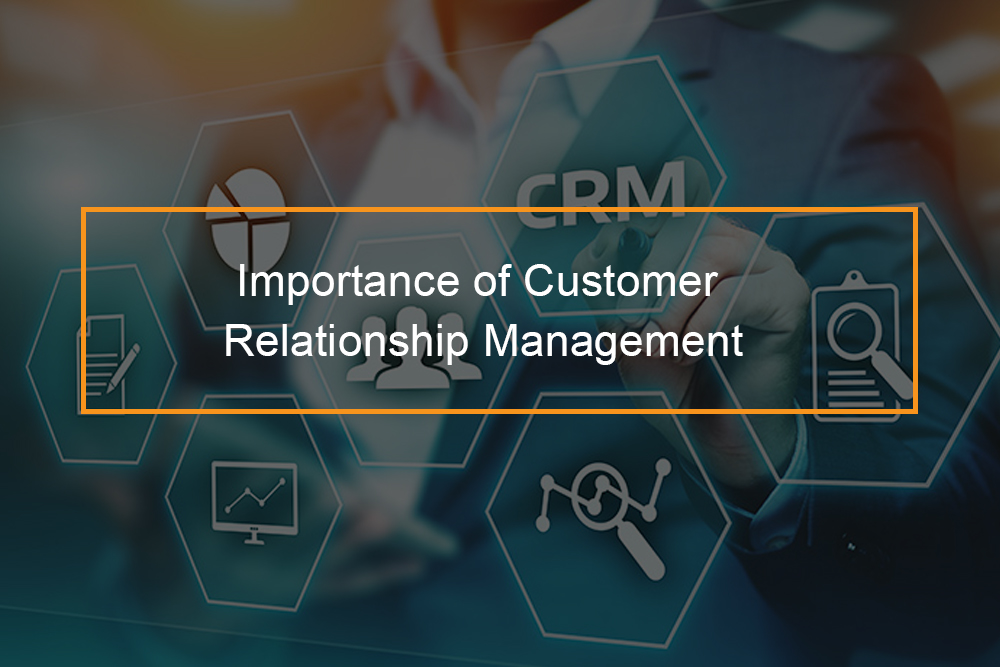
Data-driven marketing is among the most transformational changes in today’s age. This is not bluffing, the onset of Customer Relationship Management (CRM) software enables firms to classify customers by their characteristics, for example by the number of orders they have placed, the nature of those products and if they have ever contacted the company.
This post will help you learn how to exploit all these data to your advantage. Below will be the topics of discussion.
What are the benefits of customer relationship management?
Advantages of customer relationship management
Customer relationship management removes the guesswork from media planning thus enabling you to target the right customers with your advertisements. With CRM your messages get to the right audiences.
Can you imagine sending dedicated emails to one thousand customers, each with unique content and products and products that relate to their buying habits and history with your company? Below are are other benefits which come with CRMs.
Depending on customer relations
Customer relationship management is not only an important business tool but also helps to create and maintain customer relationships. The data obtained by CRM helps you to understand your customers better. When you understand your customer at a personal level you are able to form a personal and emotional bond. Once you build the personal link it becomes easy to identify the actual needs of your customers. As a result customer service changes for the better.
Installing a customer relationship management can thus come in handy in developing new marketing strategies and better business planning. It is therefore important to install CRM today to be able to cope with change in technology.
Facilitate the discovery of new customers
An ideal customer relation management system is a centralized collection of data from all the customers, a feature which helps in identifying potential customers.
The system keeps track of the profiles of the existing customers and can use their profiles to identify people to target for maximum clientage returns.
New potential customers addition show a future growth for your business. Nevertheless, a growing business using CRM software can only encounter a higher number of existing and new customers if the existing customers are maintained appropriately- even after gaining new customers.
Improves ability for the sales team to close deals
CRM systems have changed customer experience to another level especially in communication with the seller. Long gone are the days when the response to customers was slow and ineffective.
Businesses have successfully installed customer relation management systems have found it easier to close deals with customers. A CRM facilitates a quicker and more efficient response to customer leads and information. And as a result, the sales team of such companies have easily convinced customers to turn their inquiries into purchases.
Increased customer revenues
Data obtained by the CRM can be filtered to ensure the adverts and other promotions strategies do not target customers who have already bought particular products. No customer wants to see adverts of a similar product they just purchased recently, the same goes for a business. An organization can use data from CRM to make effective coordination of marketing promotions such as loyalty programs which facilitate a higher clientele retention ratio. The CRM system will help to ensure no such challenges occur.
Improve customer service
There are many strategic benefits that come with CRM systems for business. For example, the CRM system enables a business to add a personal touch to existing customer business relationships. As a result, you can treat each client as an individual rather than a group, by maintaining a repository on each clientele’s profile.
The Customer Relation Management system enables every employee to understand the needs of their customers as well what they would want to purchase.
This special feature of CRM can enable a business to adjust the services offered to cater to the needs of their customers.
In addition, CRM improves responsiveness and brings mutual understanding between business employees-this results in improved customer service. This equates to a decrease in clients disappointment in the products and overall business and builds on their loyalty to the business. The best part is the business will grow from the feedback they get over their products from people who have used them.
Good customer service enables a business to improve possible faults in their products and strategies as well as deal with customer complaints.
Improves the sales and marketing processes
Another benefit which comes with an implementation CRM system is the development of better and effective communication channels.
Businesses which have successfully installed CRM can be able to provide customers with different ways of communication.
This can be hard for companies which do not have a CRM system as delivery of information and prompt response to inquiries and feedback from customers can be hard.
Makes call centers more efficient
Access to customer history and details makes it easier for employees to target customers. It becomes easier to deal with each client depending on their history needs. And the best part is that this information can be accessed from any point in the business.
Moreover, a CMS system increases the time salespeople spend with their existing customers every day.
If you want to measure this you can identify the number of service calls made each day by the sales team or the face-to-face contact made by salespeople with the existing clients.
An important tool for measuring customer loyalty
Customer relation management software is the cheapest tool for measuring customer loyalty. Businesses can use loyal customers for professional recommendations of the business and services offered. Moreover, an organization can promote their products and services based on testimonials from loyal customers. The best part is testimonials are more often convincing than presenting a theory. This makes it easier to pull customers in the business.
Why do we need customer relationship management?
The need for customer relationship management
Today businesses operate in a global world, which is full of competitors and market barriers. Modernization is happening everywhere, happy customers tell the world and pull new customers, while unhappy customers complain to the world and move to other businesses.
If you want to keep track of today’s era it is important to implement Customer Relationship Management. The system will centralize, simplify, secure and scale your customer engagement. Below is why you need CRM.
Future view of your business
Customer Relation Management enables a business to look into trends and events that indicate the revenue and profits metrics.
The business can be able to identify indicators of future problems and rectify them. The sales team can access the activities of individual salespeople or team and trace challenge that is affecting the revenue such as territory coverage, customer communication, and opportunity close rates.
Then the business can create marketing strategies to adjust according to the faults or success of the business. A product manager can also use CMS to monitor cases and understand any product defect, support trends, or feature requests that may lead to improved products and services.
Growing your business
A successful prospecting involves salesperson effort and collection of manual and automated activities across multiple channels that result in a lead. You can use a customer relationship management to get leads from your email promotions, website and bring the information to seminars, webinars or even conferences and send the leads directly to your sales staff.
Moreover, you can assign the leads to reps immediately so as to catch more customers while your organization is still top-of-mind. You can also use the CRM system to direct your sales team to cross-sell or up-selling activities. You may use data from customer profiles to identify new product and market opportunities.
Replicating best practices
Using a CRM will help you to clear doubts about the ideas you have in engaging your customers.
The data obtained by CRM from existing customers will help you make strategies which have an impact on high-quality customer experience. Using the CRM you can create templates and use them to guide your sales team through the complex process.
Moreover, you can use workflow automation to automate activities and ensure best practices are adhered to. At the same time, you can reduce the administrative overhead of managing customer relation management.
Doing more with less
Whether you invested in a business because you know the industry very well or simply because you saw an opportunity for growth, you must have efficient ways to access the business in the line of the markets.
CRM can give you access to marketing automation which you can use to prospect in the long tail. CRM is aright tool to enable your employees to juggle the ever-increasing number of tasks, opportunities, cases, communications, and information within the business.
Risk management
You can use a customer relation management to track sales representatives who do not contact customers, dropped deals which could make your company miss sales targets or even not satisfy customers or even salespeople who may leave your company and download your customer’s profile and go with it.
A CRM will provide an audit for your business and make it easier to control sensitive information. If your business has a salesperson or customer service turnover, you will take a short while to shift accounts and opportunities for different sales using the CRM. Thus you can provide seamless services to your customers without irritating your loyal customers.
Customer intimacy
Customer relation management can obtain detailed data about your customers and their needs which can be used for tailoring your products, services, and even your customer engagement processes(customer intimacy) to fit a customer’s business.
This will help you to keep up with the competitive environment. Information obtained from the customer’s profile can be used to create enabled targeted marketing, product development, and sales activities.
Moreover, it can help to create a personal and emotional bond with each customer individually. Think of it this way, when do you even think, your bank remembers your birthday? Or is it a coincidence that Google search shows ads that are related to your interest or think it is a software which tells them.
Customer Relation Management provides customers with the impression that you understand their needs and tastes.
Why is CRM strategy important?
Why having a CRM strategy is important?
First of all, understand that CRM is about selling and not marketing. The customer relation management strategy has become even more necessary in today’s era.
With more opportunities and competition in the market, most organizations have to struggle to survive-they have to work harder to prove that they are effective and necessary for the customer.
CRM helps your business create and maintain long-term relationships, by understanding how your target audience want to interact with you, and discovering their needs. But to do this efficiently you must come up with a CRM strategy.
The main problems that business owners and marketing teams make is to CRM as a marketing function rather than a strategic function. While making a CRM strategy, address all of the following points and you will be successful.
Understand your customer and customers journeys
To create a good CRM strategy your customer must come first-this means you should understand your customer well enough.
Have a clear vision of how your customer interacts with your business across multiple activities such as purchasing a product, providing feedback and making an inquiry. Align your business processes with these interactions and it will help you determine if the business is successful or failing.
Differentiate your customer segments, then understand their behavior. You can use segments such as frequency of attendance, potential attendance, participation, and high value.
Create communication and implementation plan
Design a communication plan which can allow you to share actionable items within the strategy, and progress charts that can help you identify what has been achieved and where. Include a feedback loop in your implementation plan, where problems can be highlighted and executed.
Make the customer the king
Your business culture needs to adopt a customer-focused approach. Form a CRM team with representatives from all departments to ensure all colleagues needs and concerns are addressed. You can also include third parties with may have had interactions with your business customers.
Motivate your employees by celebrating when you succeed. Also, put measures that show everyone the importance of adopting and applying the strategy in CMS operation.
Tidy up your data
Basically, customer data is the most important part of customer relation management, it is, therefore, important to ensure your data management is of a high standard before strategy building begins in earnest.
Remember if you lose the data or mix it up you cannot understand your customer. This will affect the engagement. So the first thing when implementing a CMS for your business ensure you have a decent data policy and ensure data is correct and up to date.
Get the appropriate CMS system for your organization
Find a software which will provide the CRM system needed by your organization. The key factors in achieving a successful CRM strategy involves the following steps:
- Specification
- Implementation
- Priced tenders
- Information gathering
- Evaluation









